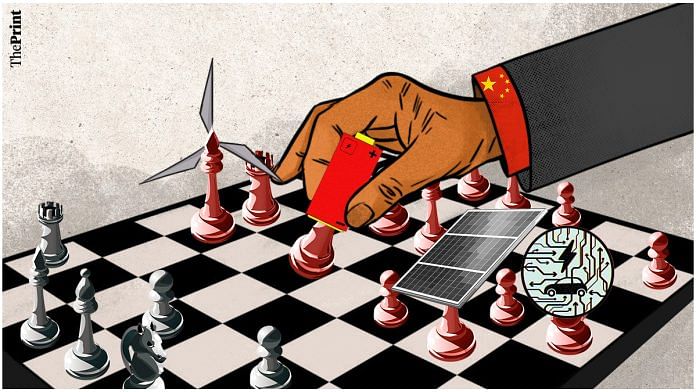Amidst the debate on China’s slowdown and “China plus one” strategies, there is the danger of forgetting just how much China has locked itself into pole position on the key businesses of the next several decades — solar and wind energy, electric vehicles, batteries, newly-important materials, and (at some stage, perhaps) semiconductors.
As countries figure out how to deal with such dominance, it is important to understand whether China’s present dominance was happenstance, or merely reflective of an already acquired manufacturing prowess. How important was strategic foresight, or was the West simply caught napping?
The answer is all of these.
What is really an industrial coup has played out in the past 15 or 20 years, even as our policy wonks were advocating a replication of China’s success in toys and apparel!
The world in general woke up far too late.
The US was celebrating its Silicon Valley tech-preneurs and their generation of wealth in trillions of dollars, while China became their supply base even as it moved unnoticed to dominate the new foundational businesses.
Today China has in place enough manufacturing capacity to supply much if not all of world demand for electric vehicles (EVs), solar panels, and wind-energy turbines, plus the equipment for making them. It may not be allowed to swamp markets, but ending Chinese dependence will take many years.
Meanwhile, Beijing is in a position to threaten trade sanctions, such as the recent stoppage of supplies of gallium and germanium, critical for chip manufacture.
Also read: Southern states staring at delimitation timebomb, govt should make them an offer
The West should blame itself. At the turn of the century, Germany promoted the installation of rooftop solar panels and encouraged China to meet the new demand. Other European countries did likewise.
China then moved quickly to acquire scale, thereby gaining huge cost advantages (added to which were state subsidies) that forced hundreds of competitors in the West to go out of business. It now dominates the full value chain from polysilicon to the end product, solar modules.
China also accounts for 60 percent of the wind turbine market, and controls the market for active pharmaceutical ingredients (API), on which India’s feted pharma industry depends.
Meanwhile, Chinese car companies saw the coming of EVs as an opportunity to upstage the legacy players focused on internal combustion engines. In battery technology, key to EVs, the Chinese achieved critical technological breakthroughs that made batteries cheaper. Sales soared off the charts as Chinese car companies began turning out low-cost EVs. Also, Tesla was encouraged to invest in a Shanghai giga-factory, the company’s largest.
The extent of strategic foresight (and the absence of it elsewhere) is most visible with regard to raw materials. China moved early to sew up much of Congo’s cobalt (displacing Western companies) and Bolivia’s lithium. When Indonesia banned the export of raw nickel, Chinese refiners descended on the country in droves. China also bought up companies in Australia, the US, and Europe that had technology, or made critical equipment.
Could other countries have done what China has?
We will soon know as the US and Europe (also India) try to replicate the Chinese success story with subsidies and various forms of protection. But Chinese success has depended on all-in strategy, including cutting-edge research in industries still evolving, the reduction of cost through free land, state-backed loans, and cheap electricity, a willingness to live with the ill effects of highly polluting production facilities, using the size of its domestic market to acquire scale, and the strategic targeting of resources.
Much of the West will find it impossible to duplicate this total package with Beijing’s single-mindedness.
What countries have done so far is an ideological about-turn by saying goodbye to the shibboleths of the post-Reagan/Thatcher era — getting government out of business, and letting markets function unfettered.
In India too, Narendra Modi promised “minimum government” in 2014 and said the business of government was not business. But his government is now fully committed to an interventionist policy — production incentives, capital subsidies, tariff protection (40 percent for solar panels), and even picking winners as would-be national champions.
What China has done is to give a global push to economic nationalism. How it will work out remains to be seen.
By special arrangement with Business Standard.
Also read: Taming Big Tech: Battles against them have reached a defining moment



